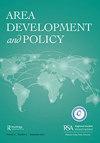The Rohingya refugees in Bangladesh: conflict with the host community over natural resources in Cox’s Bazar district
IF 1.8
Q3 DEVELOPMENT STUDIES
引用次数: 2
Abstract
ABSTRACT More than 1 million Rohingya have fled Myanmar to live in Bangladesh, mostly in Cox’s Bazar district. The government of Bangladesh has been praised worldwide for sheltering them, but this enormous influx has strained its limited resources. As the host communities struggle with the Rohingya for control over, and access to, the scarce natural resources on which they depend for their livelihood – land, water, agriculture and forests – tension and conflict arises. The host community members perceive that the government and aid agencies prioritise the Rohingya over them in allocating resources, exacerbating their resentment. Both the locals and the Rohingya are marginalised, and therefore there is a need to focus on refugee–host community resource-based conflicts and related issues before designing any policy catering to the refugees.孟加拉国的罗兴亚难民:与收容社区在科克斯巴扎尔地区争夺自然资源的冲突
摘要超过100万罗兴亚人逃离缅甸来到孟加拉国生活,其中大部分居住在科克斯巴扎尔区。孟加拉国政府因庇护他们而受到全世界的赞扬,但大量涌入使其有限的资源紧张。当收容社区与罗兴亚人争夺他们赖以生存的稀缺自然资源——土地、水、农业和森林——的控制权和使用权时,紧张局势和冲突就出现了。收容社区成员认为,政府和援助机构在分配资源时优先考虑罗兴亚人,这加剧了他们的不满。当地人和罗兴亚人都被边缘化了,因此在制定任何照顾难民的政策之前,有必要关注难民——收容社区基于资源的冲突和相关问题。
本文章由计算机程序翻译,如有差异,请以英文原文为准。
求助全文
约1分钟内获得全文
求助全文

 求助内容:
求助内容: 应助结果提醒方式:
应助结果提醒方式:


